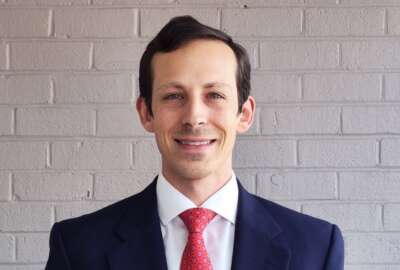
DHS, IRS investigators get Sammies nod for stopping online child pornography site
The work resulted in the rescue of 25 children and the arrest of the site administrator. Team members are finalists in this year's Service to America Medals pro...
Best listening experience is on Chrome, Firefox or Safari. Subscribe to Federal Drive’s daily audio interviews on Apple Podcasts or PodcastOne.
A team of Department of Homeland Security and IRS criminal investigators worked for months to find the source of a child pornography enterprise on the dark web. The work resulted in the rescue of 25 children and the arrest of the site administrator. Team members are finalists in this year’s Service to America Medals program. One of them, Homeland Security Investigations criminal analyst Kimberly Reece, joined Federal Drive with Tom Temin to share her story.
Interview transcript:
Tom Temin: Ms. Reece, good to have you on.
Kimberly Reece: Hi, thank you.
Tom Temin: So this was really a kind of a sad situation that you discovered this child pornography ring operating on, I guess, distributing videos through the dark web. How did this come to light in the first place that it even existed?
Kimberly Reece: So the British National Crime Agency conducted a search warrant on a pedophile in the U.K. and they came across what they thought might be bitcoin. So they weren’t quite sure how to handle it. And so they reached out to the IRS here in the United States, which was Chris Janczewski, and our U.S. Attorney’s Office in D.C., which was Zia [Faruqui]. Then they reached out to one of our agents here in Colorado Springs, which is special agent, Tom Tamsi. So then, because we’re good at working child exploitation cases. From there, we decided to get grand jury subpoenas for bitcoin exchanges. When we got those returns – grand jury returns – then we had to organize all that information. And then we targeted each person and went on further and got grand jury subpoenas for banks, telephone companies, credit card companies trying to link those back to the bitcoin addresses which ended up linking the people to their accounts. And we did summaries, referrals to our [Homeland Security Investigations] offices, which then put the ball in their court. Then they would request downloads of alleged pedophiles, uploads and downloads to them. And then it was up to the U.S. Attorney’s Office in whatever state.
Tom Temin: So basically the trail here then was from the customers through the payment system?
Kimberly Reece: Yes.
Tom Temin: On into the originator of these, of this pornographic material.
Kimberly Reece: Yes.
Tom Temin: Got it. Sounds like they operate internationally if it came – if the original tip came from Great Britain.
Kimberly Reece: Oh, yes, totally they do. We had at least – my stats may not be correct right now, but at least probably 12-15 countries that prosecuted. And even I think it was Saudi Arabia or the UAE prosecuted one of our targets, which was a first.
Tom Temin: Wow, and did you eventually get to the source, that is the creator of this material?
Kimberly Reece: We did, we did. And we requested extradition. As of right now that’s not happening.
Tom Temin: Extradition from … ?
Kimberly Reece: From Korea – South Korea.
Tom Temin: Really? And we have extradition treaty with them, correct?
Kimberly Reece: We do. But they think they can get more information out of the target than what it’s worth for us to put them in prison.
Tom Temin: So one way or another he’ll serve, probably there, do you feel?
Kimberly Reece: No, he’s already served, I think 12-18 months, which over here he would get money laundering charges and some time for child exploitation.
Tom Temin: All right. Well, let’s back up a moment. By the way, we’re speaking with Kimberly Reece. She’s a criminal analyst with Homeland Security Investigations. And along with Zia Faruqui of the Justice Department, and Chris Janczewski of the IRS, are finalists in this year’s Service to America Medals program. How did you come to this work and what does it take day to day to be able to conduct an investigation like this? Sounds like a lot of painstaking online work and probably some old fashioned telephone calls.
Kimberly Reece: Well, what brought me to this was initially out of high school, I joined the military. Then I went into the Department of Corrections and, let’s say those two career paths brought me to where I am today. I started at the bottom with Homeland Security, close to the bottom as an investigative assistant. So just kind of worked my way up and found a niche for this.
Tom Temin: Yeah and this particular type of crime, I guess is – kind of gets to the emotional level because of how bad the particular material generated by the site really was.
Kimberly Reece: Yeah, to me, it’s the worst of the worst, especially when you have sensitive targets, like law enforcement, preachers, firemen, public servants.
Tom Temin: Yeah and the citation for the Sammies Award mentioned that there were 25 children rescued. So –
Kimberly Reece: At least, probably.
Tom Temin: Yeah, what does that mean, rescued from where and under what circumstances?
Kimberly Reece: Nationwide. Just they were the ones who were violated and the National Center for Missing and Exploited Children – they reviewed those videos and those are just the ones that we actually found so far.
Tom Temin: And how are you able to find them from videos? Are there clues in the backgrounds of the videos or in the wallpaper?
Kimberly Reece: It might be a room. The child just might be recognized. For one, I think it was Great Britain, we found a room, it was a college,and then kind of track it from there.
Tom Temin: Because I once interviewed someone from FBI who said that nowadays there are forensic tools that they can look at the fabric, for example, in a hotel room, and be able to analyze that, find out where it was made and to whom it was sold. And I trace it.
Kimberly Reece: A staircase or chair or anything like that.
Tom Temin: Yeah, and how many more people did it take to do all of that, like, detail legwork? It couldn’t have been just the three or four of you that got the –
Kimberly Reece: No, so NCMEC has – I don’t know how many people they have but I know that they’re capable of reviewing, like 8,000 images, I think it’s a month. Yes like 8,000 images a month. With us, just with this one case that we had – 8,000.
Tom Temin: Sure. What other cases have you worked on that come to mind that exemplify the type of work you do day to day?
Kimberly Reece: Well, I work pretty much every type of case. So with child exploitation I work with our Colorado Springs, ICAC, which is the Internet Crimes Against Children, those guys they get probably 3,000 – 4,000 leads a year. So we don’t have the capability to track everyone, just lack those resources.
Tom Temin: Got it? And in the case at hand here, with this Korean pornographer, did Great Britain continue with you on the part of the greater investigative team?
Kimberly Reece: Actually, we took the lead on it, and we would send them their target names. I think as of now they’re working more of their own targets. They’re kind of picking up the pace.
Tom Temin: It sounds like there’s an unending supply of possible cases that you could do if you had unlimited people. You could sue them all.
Kimberly Reece: It would never stop, never stop. But Great Britain I think has already arrested 14 people.
Tom Temin: Yeah and in dealing with this particular type of perpetrator, how do you kind of let it go at night so that you can live a normal life and not let it take over because as you say, it is the worst of the worst. And it has an emotional content that like simple, you know, say someone stealing cars wouldn’t have.
Kimberly Reece: Right. Yeah, these are these are sick individuals. During the heat of the case, you know, I just worked like 12-16 hours a day for almost two years. When I finally was able to kind of break free, I got back to trail running because it’s just it’s a way of not thinking about anything, except while you’re out there. You have to worry about which rock I’m gonna not stumble over and break a leg or something.
Tom Temin: Yeah, I’ve done a little trail running myself and it does require a lot of concentration.
Kimberly Reece: Yeah, you know what you have to concentrate on.
Tom Temin: Alright, well, we thank you. Kimberly Reece is a criminal analyst with Homeland Security Investigations, and a finalist in this year’s Service to America Medals program. Thanks so much for joining me.
Kimberly Reece: Thank you, sir.
Tom Temin: Her team members are Zia Faruqui of the Justice Department and Christopher Janczewski of the IRS. We’ll post this interview along with a link to more information at FederalNewsNetwork.com/FederalDrive. Hear the Federal Drive on demand and on your device. Subscribe at Apple Podcasts or Podcastone.
Read more about their work here.
Copyright © 2024 Federal News Network. All rights reserved. This website is not intended for users located within the European Economic Area.
Tom Temin is host of the Federal Drive and has been providing insight on federal technology and management issues for more than 30 years.
Follow @tteminWFED





